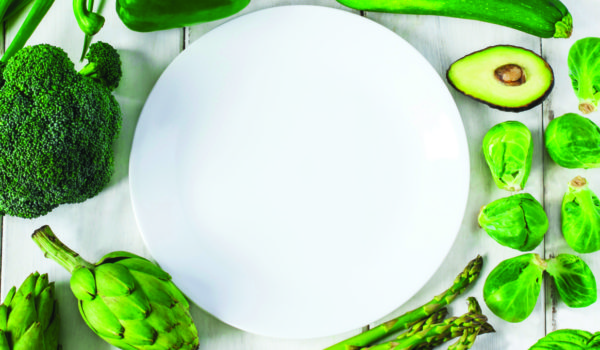
A healthy diet produces a healthy environment
By Kelsey DeClue
Everyone knows green veggies are a must in any healthy diet — the phrase “eat your greens” is drilled into us by generations who came before. But according to a recent Centers for Disease Control and Prevention (CDC) report, only one in 10 adults get enough fruit or vegetables. And that’s a problem because as the researchers note, many people are missing out on the essential vitamins, minerals and fiber that produce and those ever-important green vegetables provide.
Green vegetables, particularly leafy greens, supply vitamin C, folate, calcium, iron and other nutrients, although the amounts vary by the type of green.
When it comes to healthy greens, the darker and richer in color, the better. Think kale, chard, broccoli and Brussel sprouts; however, if you’re not a fan of dark green produce, you can still reap tons of health benefits from a variety of green veggies, fruits and other foods you should be eating more frequently.
The benefits of “going green” when it comes to your diet, extend beyond personal health. Have you ever considered how your diet affects the environment? Food and climate change cross paths in a big way. Every day, huge amounts of food are produced, processed, transported, consumed and thrown away. This puts a serious strain on the earth’s natural resources. The good news is recent research has revealed dietary changes that we can all make to reduce food’s impact on the planet. Less is more when it comes to eating your way toward a healthier Earth. Here are three tips to help you start shrinking your carbon footprint today:
1. Waste less. About one-third of food is thrown out every year around the world. In the U.S. alone, 40 percent of food is wasted annually, on average, at a cost of at least $589 per family. Food waste largely contributes to the depletion of the earth’s resources, since production requires water, land, and energy — even for the food that ends up in landfills. Reducing food waste saves you money by buying less. It also reduces methane emissions from landfills, and it conserves energy. Try planning your meals at the start of each week and only buy what you need for that time period. Donate extra nonperishable items from your pantry to your local food bank.
2. Eat fewer animal products. Meat production hits the earth’s resources harder than any other food group, followed by dairy. Animal-based foods play a big role in greenhouse gas emissions, which contribute to global warming. It also uses up a lot of the earth’s land and water. Beef production has an even greater impact on the environment than other animal products. Reducing beef consumption and eating more chicken, pork, eggs and plant-based protein sources — such as beans, nuts and grains — could decrease greenhouse gas emissions from food production by up to 35 percent.
3. Reduce your calorie intake. When it comes to changing your diet in an effort to help the planet, one of the simplest approaches is to reduce the number of calories you eat. Eating less calories — especially by eating more fruit, vegetables and dietary fiber rather than meat — can help you lose weight and improve your overall health. That would reduce overall healthcare costs and resources and would hopefully lead to less waste and a need for less food.
The easiest way to incorporate
more healthy greens into your diet is in small doses. Don’t feel like you have to
eat a big salad each meal — mix traditional spaghetti noodles with a few zoodles (zucchini ribbons), throw some spinach into your scrambled eggs in the morning, or toss a couple of broccoli
stalks into your lunchtime smoothie or
top your homemade pizza with some arugula.
Does your household have an airfryer? Crisp up your greens by baking or airfrying some kale chips as a great substitute for the sodium and trans-fat laden store-bought options. And remember, your greens don’t have to be relegated to the vegetable variety. Green apples and kiwis provide a boost of fiber and Vitamin C. The possibilities are endless with a little creativity.


